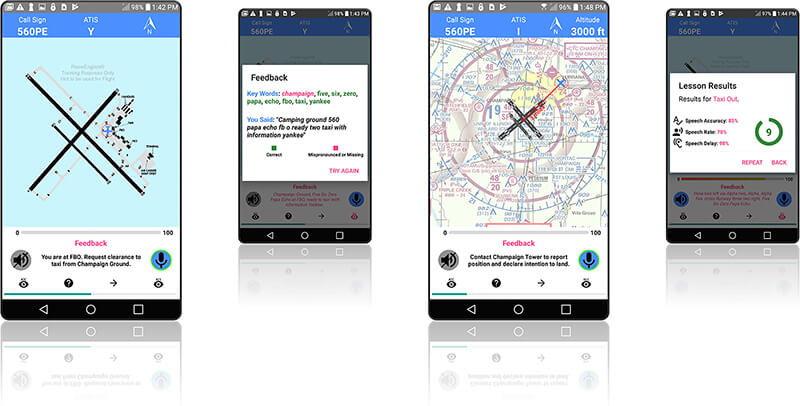December 19, 2018
Houston, we have a solution: Technology helps new pilots better communicate with air traffic control, increase safety
 Two Purdue University alumni have come up with simulator technology to help new pilots master radio communication skills. (Image provided)
Download image
Two Purdue University alumni have come up with simulator technology to help new pilots master radio communication skills. (Image provided)
Download image
WEST LAFAYETTE, Ind. – Learning to speak a new language can be difficult in any setting. Now, imagine trying to learn the language of the sky as a new pilot, while also navigating the instrument panel and learning to fly the plane safely.
Two Purdue University alumni have come up with technology to help new pilots master radio communication skills to better interact with air traffic control operators.
Muharrem Mane, an alumnus from the School of Aeronautics and Astronautics, and Eren Hadimioglu, an alumnus from the School of Aviation and Transportation Technology, created and developed PlaneEnglish.
It is an aviation radio simulator to help new pilots acquire radio communication skills becoming proficient in aviation phraseology and communication, developing advanced skills in realistic environments, and giving instantaneous feedback through voice recognition and speech analysis.
The app-based tool also aims to help new pilots reach Federal Aviation Administration and International Civil Aviation Organization standards for English language use, put in place to ensure safety in the sky.
“We’ve gotten feedback that this is something very different and very new in the area of flight training,” Mane said. “It’s a combination of ease of access — train on the go — the way we’re doing the speech analysis, and feedback to the user that is something that doesn’t exist out there.”
 PlaneEnglish is an aviation radio simulator to help new pilots acquire radio communication skills. (Image provided)
Download image
PlaneEnglish is an aviation radio simulator to help new pilots acquire radio communication skills. (Image provided)
Download image
PlaneEnglish has more than 50 lessons accessible at any time. Lessons guide users through simple and complicated interactions with air traffic control on every phase of flight from taxi out, to takeoff, to airspace entrance, to approaches, to taxi in.
Each simulation includes visual clues that show altitude, distance from an airport and direction. A variety of airports can be selected or one will be randomly selected for the user.
Users are required to respond properly in specific situations, using the correct phraseology, speech rate and other factors. There can be as many as five or six exchanges back and forth with “air traffic control.” Then users are graded on those responses.
“Every time you do a lesson, there is going to be something that changes,” Mane said.
“You can’t just memorize.”
Mane also said the technology comes at a time when the FAA has put an increased focus on English language proficiency for pilots, and started asking instructors to test their students on their speaking and communication abilities.
PlaneEnglish is available for Android, and the next step is developing it for iOS. A Kickstarter campaign has been launched to help toward that goal.
The work aligns with Purdue's Giant Leaps celebration, celebrating the university’s global advancements in space exploration as part of Purdue’s 150th anniversary. This is one of the four themes of the yearlong celebration’s Ideas Festival, designed to showcase Purdue as an intellectual center solving real-world issues.
The creators of PlaneEnglish are working with the Purdue Research Foundation as they develop their technology.
About Purdue Research Foundation
The Purdue Research Foundation is a private, nonprofit foundation created to advance the mission of Purdue University. Established in 1930, the foundation accepts gifts; administers trusts; funds scholarships and grants; acquires property; protects Purdue's intellectual property; and promotes entrepreneurial activities on behalf of Purdue. The foundation manages the Purdue Foundry, Purdue Office of Technology Commercialization, Purdue Research Park and Purdue Technology Centers. The foundation received the 2016 Innovation and Economic Prosperity Universities Award for Innovation from the Association of Public and Land-grant Universities. For more information about funding and investment opportunities in startups based on a Purdue innovation, contact the Purdue Foundry at foundry@prf.org.
Writer: Chris Adam, 765-588-3341, cladam@prf.orgSource: Muharrem Mane, muharrem@planeenglish.net

